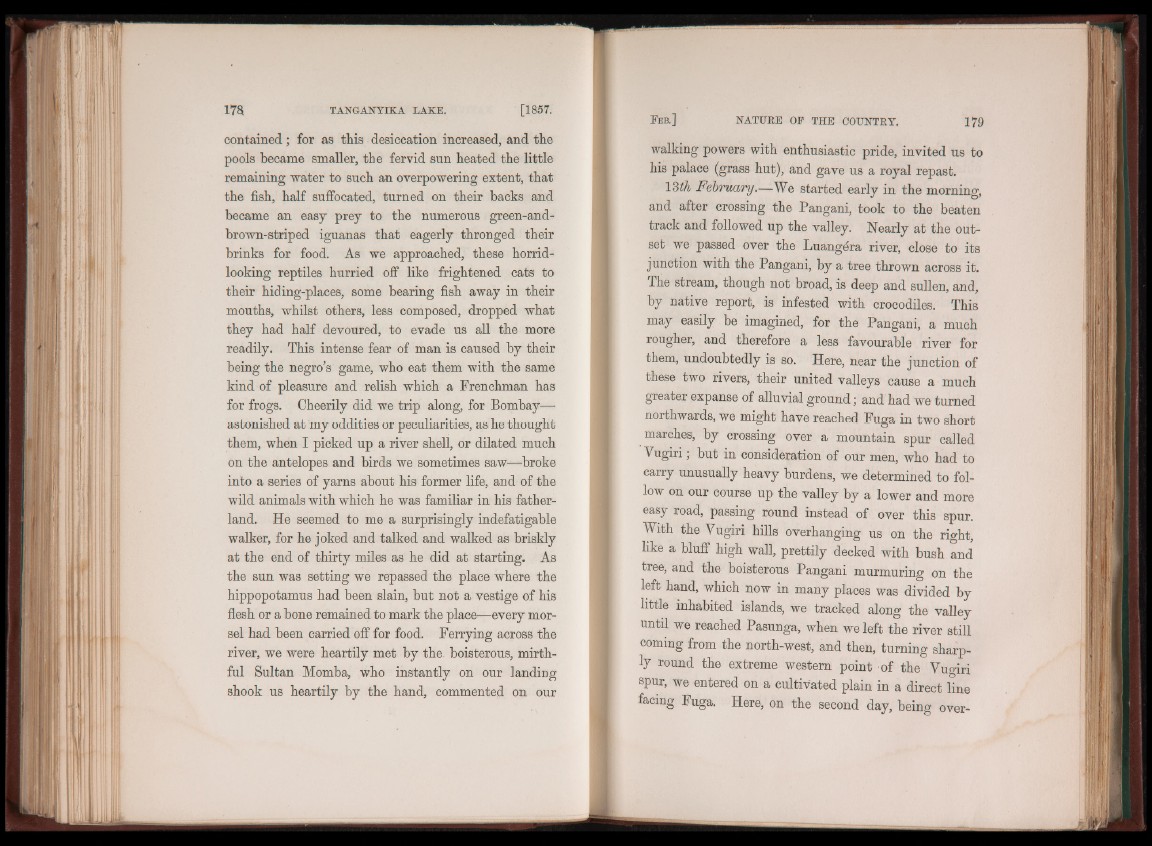
contained; for as this desiccation increased, and the
pools became smaller, the fervid sun heated the little
remaining water to such an overpowering extent, that
the fish, half suffocated, turned on their backs and
became an easy prey to the numerous green-and-
brown-striped iguanas that eagerly thronged their
brinks for food. As we approached, these horrid-
looking reptiles hurried off like frightened cats to
their hiding-places, some bearing fish away in their
mouths, whilst others, less composed, dropped what
they had half devoured, to evade us all the more
readily. This intense fear of man is caused by their
being the negro’s game, who eat them with the same
kind of pleasure and relish which a Frenchman has
for frogs. Cheerily did we trip along, for Bombay—
astonished at my oddities or peculiarities, as he thought
them, when I picked up a river shell, or dilated much
on the antelopes and birds we sometimes saw—broke
into a series of yarns about his former life, and of the
wild animals with which he was familiar in his fatherland.
He seemed to me a surprisingly indefatigable
walker, for he joked and talked and walked as briskly
at the end of thirty miles as he did at starting. As
the sun was setting we repassed the place where the
hippopotamus had been slain, but not a vestige of his
flesh or a bone remained to mark the place—every morsel
had been carried off for food. Ferrying across the
river, we were heartily met by the. boisterous, mirthful
Sultan Momba, who instantly on our landing
shook us heartily by the hand, commented on our
walking powers with enthusiastic pride, invited us to
his palace (grass hut), and gave us a royal repast.
13 ih February.—We started early in the morning,
and after crossing the Pangani, took to the beaten
track and followed up the valley. Nearly at the outset
we passed over the Luangera river, close to its
junction with the Pangani, by a tree thrown across it.
The stream, though not broad, is deep and sullen, and,
by native report, is infested with crocodiles. This
may easily be imagined, for the Pangani, a much
rougher, and therefore a less favourable river for
them, undoubtedly is so. Here, near the junction of
these two rivers, their united valleys cause a much
greater expanse of alluvial ground; and had we turned
northwards, we might have reached Fuga in two short
marches, by crossing over a mountain spur called
Vugiri; but in consideration of our men, who had to
carry unusually heavy burdens, we determined to follow
on our course up the valley by a lower and more
easy road, passing round instead of over this spur.
With the Vugiri hills overhanging us on the right,
like a bluff high wall, prettily decked with bush and
tree, and the boisterous Pangani murmuring on the
left hand, which now in many places was divided by
little inhabited islands, we tracked along the valley
until we reached Pasunga, when we left the river still
coming from the north-west, and then, turning sharply
round the extreme western point of the Vugiri
spur, we entered on a cultivated plain in a direct line
facing Fuga. Here, on the second day, being over